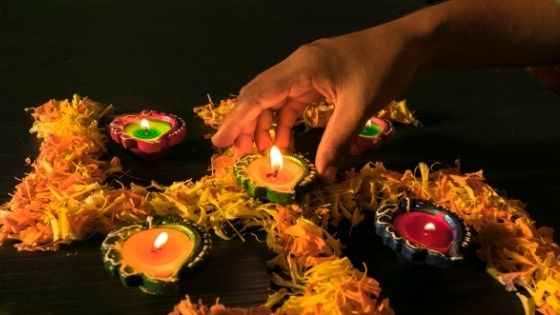What is Dhanteras?
Dhanteras is a festival dedicated to ushering in wealth and prosperity. Every year this festival of wealth is celebrated on the first day of the 5 days of Diwali celebration. It falls on the thirteenth day of the Krishna Paksha (waning moon phase), in the Hindu month of Kartik, which is the month of October-November, as per the Gregorian calendar. The term Dhanteras is comprised of ‘Dhan’ meaning wealth and ‘Teras’ means the thirteenth (13th) day.


Significance of Dhanteras
The Goddess of wealth, Goddess Mahalaxmi, is worshipped by following the prescribed rituals with devotion on this day. On this day, it is a common practice to buy Gold or Silver in the form of bricks, coins or ornaments etc., as it is considered a significant symbol of welcoming wealth. Other than this, metal utensils or household items, like electronic goods are also bought on this day, with the same intention. Dhanteras is celebrated in different styles in the different states of India. Diwali being the festival of lights, there is a ritual of lighting 13 oil lamps on this day of Dhanteras, kept outside the main entrance of the house. Gambling, especially among the business community is common on this day, as it is considered that gambling on this day is a harbinger of wealth and prosperity. Dhanteras is followed by Choti Diwali, the next day.
The other significance of Dhanteras is that Lord Dhanvantari, an avatar of Lord Vishnu, is also worshipped. Lord Dhanvantari is the Hindu deity of Ayurveda and good health. He is the Ayurvedic Physician of the Celestial world as mentioned in the Vedas and Puranas and is said to be a surgeon par excellence. Lord Dhanvantari is said to have arisen during the Samudra Manthan(the churning of the Cosmic ocean). He had the pot of ‘Amrit’ or the nectar, Therefore, it is a day when invoking Lord Dhanvantari brings abundant energy of good health, relief from chronic illnesses and other health-related benefits. In fact, it is interesting to note that the day of Dhanteras has been declared by “National Ayurveda Day”, since 2016.
Story of Dhanteras
Dhanteras is also called ‘Yamadeepdaan’ as there is a story behind it. The story is about King Hima, whose son’s horoscope predicted that when the Prince would get married, four days post that he would die of a snake bite. The Prince got married. On the night of the fourth day his wife, knowing about the prediction, heaped all her Gold and Silver ornaments along with Gold and Silver coins at the threshold of the room and lit lamps. To keep the Prince awake she sang songs throughout the night. The God of death, Yama, transformed himself into a snake and arrived at the door but such was the dazzle of the Gold and Silver with the light of the lamps that it was impossible for Yama to see clearly. He climbed up on the heaped ornaments, coins and heard the new bride’s songs through the night. At dawn, Yamaraj or Snake left without harming the Prince. Thus the predicted death of the young Prince was evaded by the intelligent idea of his newly wedded bride.
This story finds it connected to the tradition of lighting 13 oil lamps outside the house on Dhanteras is said to be done by women to pay their reverence to Lord Yama, so that their husbands and family members are protected. Therefore, Dhanteras is also known as Yamadeepdaan.
Preparations on Dhanteras
Before the auspicious occasion of Dhanteras, people clean their house and decorate the house beautifully. People shop for new clothes, utensils and buy colours known as rangoli, earthen lamps, kandil, torans and other decorative things.
Dhanteras Puja Vidhi
On the eve of Dhanteras Lord Ganesh, Lord Kuber, Goddess Lakshmi, God Yama and Lord Dhanvantari are worshipped. Begin by cleaning the place where the Puja is supposed to be organised. Keep all the Puja samagri handy so that you do not miss any of it while performing the puja. Place a red cloth on the surface where the deity idols and photographs are to be worshipped. Light ghee diya incense sticks and dhoop.
How is Dhanteras celebrated?
Generally, preparations of Diwali start days before the festival commences and before Dhanteras every house is cleaned thoroughly, can be called spring-cleaning. Clutter and unused things are disposed of, taking place for the new, which has meaning on a spiritual level too. Cleaning away unnecessary thoughts, we hold on to, is necessary for inviting the new in life. It is said that Maa Laxmi stays only in a neat and clean place. In order to welcome the Goddess of wealth, houses, offices are not only cleaned but decorated with clay oil lamps, electric lights, Flower garland decorations on top of the main entrance, beautiful Rangoli, oil Lamps etc.
“Health is wealth”, is a well known saying and Hindu rituals are not only spiritual but have scientific connotations too. In the Southern states of India, Lord Dhanvantari is worshipped on this day. The day starts with the cleansing and taking the Ayurvedic Abhyanga Snana, early in the morning by first a Sesame oil massage of full body and then taking bath with a scrub of a mixture of natural herb paste. If seen from another point of view, Dhanteras/Diwali falls at the beginning of the winter season in India when the skin becomes dry, the oil massage moisturizes the skin and also removes environmental pollution settled on our skin. However, the Ayurvedic paste too varies from state to state. Lord Dhanvantari is worshipped to shower His blessings abundantly as good health which is of primary importance in everyone’s life.
In many parts of India, on the day of Dhanteras, people also follow the tradition of buying broomstick, symbolic of clearing off or sweeping off the negative energies and financial lack from the house.
Dhanteras is an auspicious day for any new beginning, which can be that of new projects, business or any good thing. New vehicles are also bought on this day, property too, as these form part of wealth too.
In essence, Dhanteras can be summarized as a day to welcome the abundance of wealth in the materialistic form and that of good health, all of which is done with a joyous touch of the festival.























